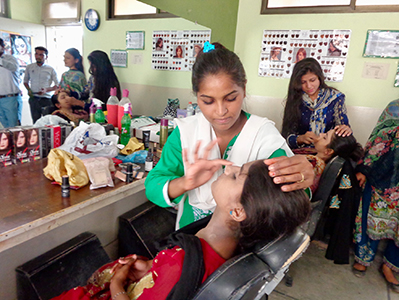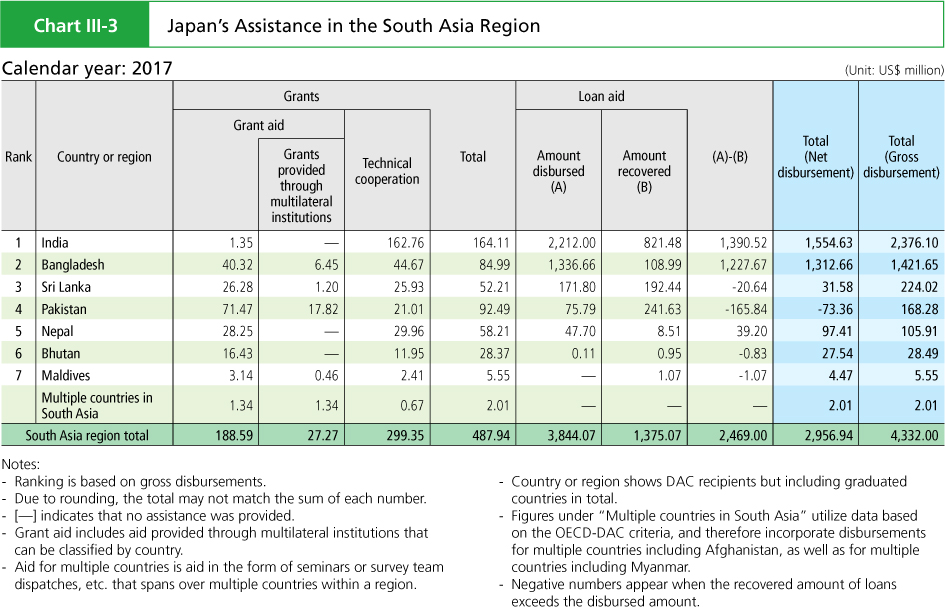2 South Asia
The South Asian region includes countries with enormous economic potential including India, and the region has been increasing its presence in the international community. South Asia is strategically important to Japan because of its location on a land route and sea lane that connect East Asia with the Middle East, and is also crucial for addressing global environmental issues. In addition, the region is of great interest to Japan and the rest of the international community in regard to the role it plays in international efforts against terrorism and violent extremism.
At the same time, the South Asian region still faces many issues that must be addressed. These issues include a lack of basic infrastructure such as roads, railroads, and ports, as well as growing population, low school enrollment rate in primary education, underdeveloped water and sanitation facilities, inadequate healthcare and medical systems, insufficient maternal and pediatric healthcare, infectious diseases, and unconsolidated rule of law. Poverty reduction is a particularly challenging problem. Approximately 250 million people among the total population of approximately 1.7 billion in South Asia are said to be living in poverty, making it one of the world’s poorest regions.(Note 5) South Asia is also a key region, along with Africa, in achieving the SDGs.
Japan provides assistance with a focus on improving socio-economic infrastructure in order to harness the economic potential of South Asia as well as to alleviate the growing gap between the rich and the poor.
■Japan’s Efforts
With India, a key player in South Asia, the leaders of Japan and India make annual mutual visits to each other’s country, and Japan promotes cooperation in a wide range of fields based on the “Special Strategic and Global Partnership.” These include economic cooperation as well as cooperation in the fields of politics and security, economy, and academic exchanges. In recent years, India has been the largest recipient of Japan’s ODA loans, and Japan has provided assistance to India for the development of economic infrastructure, mainly in the fields of electric power and transport.
During the visit by Prime Minister Modi to Japan in October 2018, the two countries exchanged notes on the provision of ODA loans for a total of seven projects, including the construction of the Mumbai – Ahmedabad High Speed Railway (MAHSR), for which Japan’s Shinkansen (bullet train) system will be introduced, as well as the construction of bridges, etc. in the northeastern part of India to contribute to regional connectivity. At the Japan-India Summit Meeting, Prime Minister Modi expressed his appreciation for Japan’s ODA. Also, in the Japan-India Vision Statement, Prime Minister Abe expressed Japan’s intention to continue to provide support for initiatives to boost the development of India’s social industry through a variety of activities including key quality infrastructure and capacity-building projects. For example, the high-speed railway development plan is expected to enable travel between Mumbai and Ahmedabad in two hours—which currently takes at least seven hours on existing express trains and approximately one and a half hours by plane—while reducing the train fee to roughly half of the airfare. Thus, Japan’s ODA plays a significant role in the growth of India, through infrastructure development, measures to combat poverty, development of the investment environment, human resources development, etc.
With Bangladesh, where there has been remarkable growth and where an increasing number of Japanese companies have been conducting business in recent years, Japan is strengthening policy dialogue and promoting economic cooperation under the Bay of Bengal Industrial Growth Belt (BIG-B) initiative, in order to strengthen bilateral relations. The three pillars of the initiative include the following: (i) Development of economic infrastructure in Bangladesh, (ii) Improvement of the investment environment, and (iii) Enhancing connectivity. In 2016, when Prime Minister of Bangladesh Sheikh Hasina visited Japan to attend the Outreach Meeting of the G7 Ise-Shima Summit, Prime Minister Abe stated that “Japan will continue to support Bangladesh in realizing its vision of becoming a middle-income country by 2021,” and as a part of that, expressed his expectations for the advancement of the BIG-B initiative, as well as for the expansion of the exchanges of people and the further promotion of trade and investment between the two countries. Under these agreements between the two leaders, in June 2018, Japan and Bangladesh signed an Exchange of Notes concerning the provision of ODA loans for a total of six projects, including the “Dhaka Mass Rapid Transit Development Project (III),” the “Matarbari Port Development Project (engineering services),” and the “Jamuna Railway Bridge Construction Project I,” which will contribute to enhanced connectivity in Bangladesh and the development of economic infrastructure.

Students attending a hairdressing course at the job training center that was constructed in Karachi, in Sindh province located in the southern part of Pakistan, through Grant Assistance for Grass-Roots Human Security Project (Photo: Teruyo Mokubi, Grass-Roots Project Coordinator/Consulate General of Japan in Karachi)
Sri Lanka, which is positioned in a strategic position along sea lanes connecting Asia with the Middle East and Africa, has traditionally been a country that is friendly toward Japan. Following Prime Minister Wickremesinghe’s visit to Japan in April 2017, President Sirisena visited Japan in March 2018, and the two countries agreed on strengthening cooperation particularly in the fields of enhancing connectivity and maritime matters, toward the realization of a free and open Indo-Pacific. Furthermore, during President Sirisena’s visit to Japan, Japan announced that it will provide support rooted in the lives of the Sri Lankan citizens. This included an Exchange of Notes on the provision of ODA loans amounting to approximately 10.6 billion yen, to provide advanced medical equipment to contribute to improving health and medical services in Sri Lanka.
Japan will continue to provide support in the field of infrastructure development, including transportation networks such as roads and ports as well as electric power infrastructure. This support contributes to quality economic development in Sri Lanka as well as to improvements in the business environment for Japanese companies operating in the country. Moreover, considering Sri Lanka’s history of internal conflict and the current situation of increased disparity, Japan will also continue to carry out cooperation useful for national reconciliation and provide assistance to cope with natural disasters, including livelihood improvement and industrial development with a focus on the agricultural sector for regions that are lagging behind in development.
The Maldives, like Sri Lanka, is in a strategic position along the sea lanes of the Indian Ocean, and holds geopolitical importance for Japan. Foreign Minister Kono visited the Maldives in January 2018, while the Foreign Minister of the Maldives visited Japan in June and December of the same year, soon after the inauguration of the new administration of the government. The two ministers held a Foreign Ministers Meeting and agreed on cooperating toward the realization of a free and open Indo-Pacific. Under this policy, in 2018, they exchanged notes on the grant aid of 300 million yen respectively for the provision of medical equipment to improve the quality of health and medical services as well as access to such services, and for the provision of equipment to tackle oil pollution in order to build capacity for dealing with oil spills at sea.
Pakistan plays a vital role in the international community’s initiatives to eradicate terrorism. Japan has thus far provided support for improving the security capabilities of airports and ports, as well as support for the displaced persons due to military operations to eliminate terrorists. Japan is also implementing support to strengthen border control capacity with respect to illegal drug trafficking and international organized crime, and support to provide equipment and products in the fields of peacebuilding, humanitarian assistance, and counter-terrorism. Furthermore, Japan also provides support in the field of healthcare, such as the procurement of vaccines needed to prevent the spread of polio (see “Project Introduction” for details).
With regard to Nepal, which has traditionally been a friendly country with Japan, the relationship between Japan and Nepal was further strengthened and advanced through the visit to Japan by Foreign Minister Gyawali in 2018, and visit to Nepal by Foreign Minister Kono in January 2019. In the aftermath of the major earthquake that struck Nepal in 2015, Japan dispatched Japan Disaster Relief (JDR) Teams, and provided emergency relief goods, along with the implementation of Emergency Grant Aid amounting to $14 million (¥1.68 billion) through eight international organizations including the International Organization for Migration (IOM), which improved the living conditions of 13,592 evacuated households through the provision of shelter and commodities. Moreover, applying the “Build Back Better” concept formulated at the UN World Conference on Disaster Risk Reduction in Sendai to Nepal’s medium to long-term reconstruction process, Japan is implementing an assistance package at a scale totaling $260 million (over approximately ¥32 billion) toward rebuilding a resilient Nepal, focusing on rebuilding houses (approximately 40,000 homes), schools (approximately 280 schools), and public infrastructure. Japan is also providing a range of technical support to reduce the damage from earthquake disasters.
In addition, in view that Nepal is putting effort into consolidating and developing its democracy through the new Constitution, Japan is providing support to improve the governance capacity of the central and local governments, as well as to reflect the needs of residents including the socially vulnerable in government policies. Japan has provided funds in support of the “School Sector Development Plan,” which is an education development plan established by the Government of Nepal to narrow gaps in children’s academic abilities and access to education among regions and ethnic groups. Japan has also provided support for the “Human Resource Development Scholarship Project” by covering the tuition and other costs required for young government officials from Nepal to obtain degrees in Japanese graduate schools.
Furthermore, Japan has been building good relations with Bhutan since the establishment of diplomatic relations in 1986, and celebrated the 30th anniversary of diplomatic relations between the two countries in 2016. The relationship between the two countries has been deepening in recent years, with the convention of the Summit Meeting in April 2018 and the Foreign Ministers Meeting in June 2018. Japan’s economic cooperation toward Bhutan serves as the foundation for friendly relations between the two countries. As such, Japan has been providing support mainly through technical cooperation and grant aid, while respecting Bhutan’s national development plan that focuses on the country’s fundamental philosophy of Gross National Happiness (GNH). Japan’s support has been steadily bearing fruit in fields including the improvement of agricultural productivity, the development of economic infrastructure such as road networks and bridges, as well as human resources development. In June 2018, Japan and Bhutan signed an Exchange of Notes on the “Project for Human Resource Development Scholarship,” which is a grant aid project that covers the tuition and other costs required for young government officials from Bhutan to obtain masters or doctoral degrees. This assistance not only contributes to the development of Bhutan, but also to the nurturing of human resources for strengthening good relations between Japan and Bhutan.
![[Japan’s international cooperation policy] Priority issues in the South Asia Region](imgs/p082_1.jpg)

- Note 5: Source: World Bank website Population: https://data.worldbank.org/indicator/SP.POP.TOTL?locations=8S
